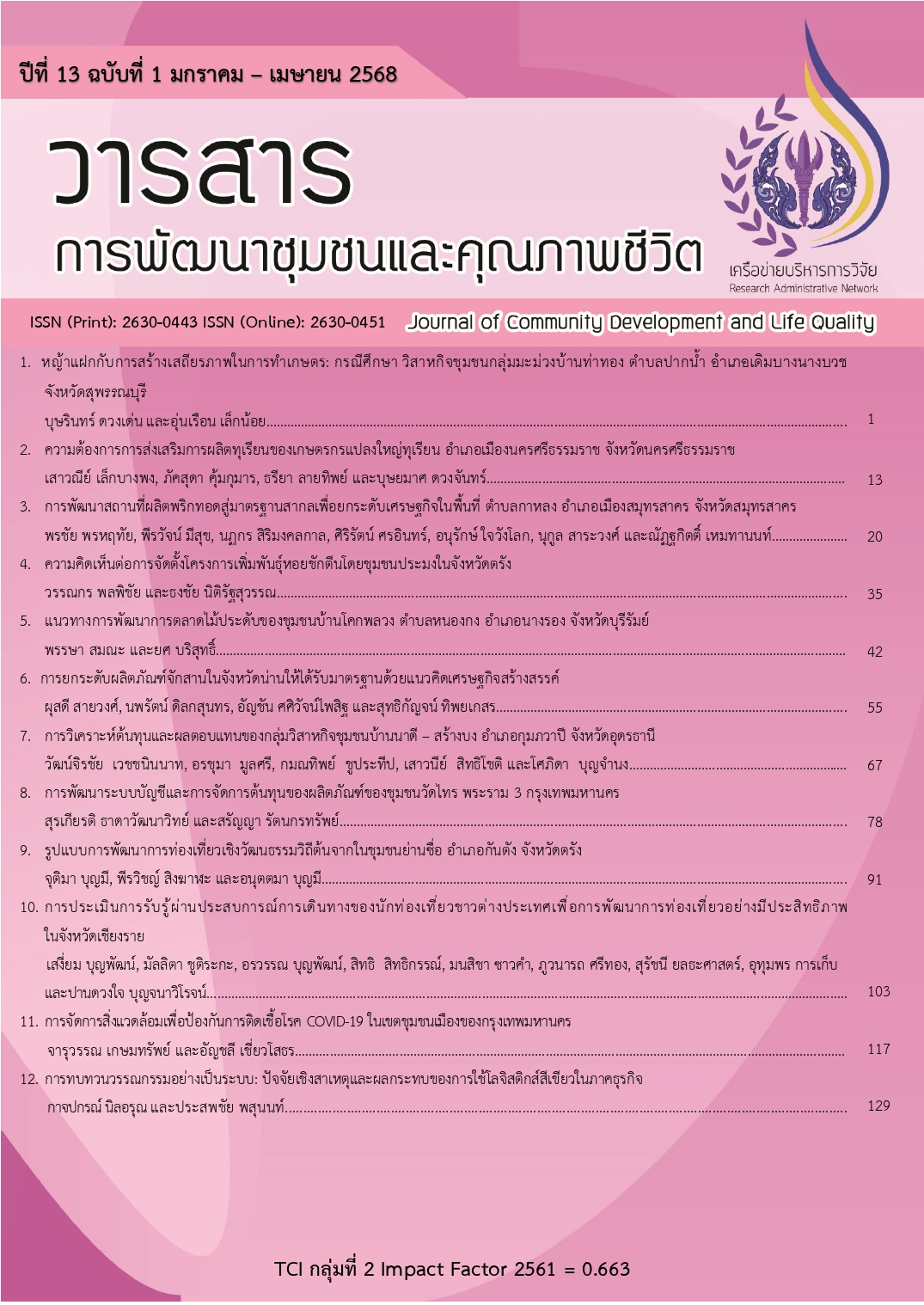การทบทวนวรรณกรรมอย่างเป็นระบบ: ปัจจัยเชิงสาเหตุและผลกระทบ ของการใช้โลจิสติกส์สีเขียวในภาคธุรกิจ
Main Article Content
บทคัดย่อ
การวิจัยนี้มีวัตถุประสงค์เพื่อสังเคราะห์บทความเกี่ยวกับปัจจัยเชิงสาเหตุและผลกระทบของการใช้
โลจิสติกส์สีเขียวในธุรกิจ โดยใช้กระบวนการวิจัยเชิงเอกสารในรูปแบบการทบทวนวรรณกรรมอย่างเป็นระบบ และกำหนดเกณฑ์ในการคัดเลือกบทความ ศึกษาวรรณกรรมของประเทศจากฐานข้อมูล Scopus จำนวน 6 บทความ และฐานข้อมูลในประเทศไทย โดยใช้ฐานข้อมูล Thai Journals จำนวน 3 บทความ ผลการวิจัยพบว่า ปัจจัยเชิงสาเหตุของการใช้โลจิสติกส์สีเขียวในธุรกิจ จำแนกเป็นปัจจัยเชิงสาเหตุ 2 ปัจจัย ได้แก่ ปัจจัยแรงผลักดันจากภายใน ประกอบด้วย 3 องค์ประกอบ คือ แรงจูงใจภายใน อุปสรรคภายใน และความกังวลเกี่ยวกับภาพลักษณ์ของบริษัท ปัจจัยแรงกดดันจากภายนอก ประกอบด้วย 3 องค์ประกอบ คือ การสนับสนุนจากภายนอก แรงกดดันจากสังคม และกฎหมายหรือข้อบังคับต่าง ๆ สำหรับผลกระทบของการนำโลจิสติกส์สีเขียวไปใช้ในธุรกิจ 5 ด้าน ได้แก่ เศรษฐกิจหมุนเวียน ความยั่งยืนทางสิ่งแวดล้อม ความสามารถทางการแข่งขัน ผลการดำเนินงานของธุรกิจ และหลักปฏิบัติที่เป็นมิตรต่อสิ่งแวดล้อม ซึ่งผลการทบทวนวรรณกรรมอย่างเป็นระบบสามารถสร้างเป็นกรอบแนวคิดในการวิจัยเชิงประจักษ์ เพื่อค้นคว้าหาความสัมพันธ์ของปัจจัยเชิงสาเหตุและผลกระทบของแต่ละปัจจัยต่อไป
Article Details

อนุญาตภายใต้เงื่อนไข Creative Commons Attribution-NonCommercial-NoDerivatives 4.0 International License.
กองบรรณาธิการขอสงวนสิทธิ์ในการตรวจและแก้ไขบทความที่เสนอเพื่อตีพิมพ์ในวารสารการพัฒนาชุมชนและคุณภาพชีวิต
บทความหรือข้อความคิดเห็นใด ๆ ที่ปรากฏในวารสารการพัฒนาชุมชนและคุณภาพชีวิต เป็นวรรณกรรมของผู้เขียนโดยเฉพาะคณะผู้จัดทำไม่จำเป็นต้องเห็นด้วย และไม่ใช่ความรับผิดชอบของมหาวิทยาลัยและคณะผู้จัดทำ / บรรณาธิการ
เอกสารอ้างอิง
Aloui, A., N. Hamani, R. Derrouiche and L. Delahoche. 2022. Assessing the benefits of horizontal collaboration using an integrated planning model for two-echelon energy efficiency-oriented logistics networks design. International Journal of Systems Science: operations & Logistics 9(3): 302-323.
Ariyawong, P., N. Ekbang, P. Surin, A. Thipboonaj and N. Chuangchoeam. 2023. Waste management guidelines for Lampang provincial administrative organization: A case study of Pichai Town municipality. Journal of Community Development and Life Quality 12(1): 70-85.
Dansomboon, S. and T. Narunart. 2020. Green logistics and supply chain management affection performance outcomes of Thai automative industry. MUT Journal of Business Administration 17(1): 125-145. (in Thai)
de Souza, E. D., J. C. Kerber, M. Bouzon and C. M. T. Rodriguez. 2022. Performance evaluation of green logistics: Paving the way towards circular economy. Cleaner Logistics and Supply Chain 3: 100019, doi: 10.1016/j.clscn.2021.100019.
Dhar, B. K., I. Harymawan and S. M. Sarkar. 2022. Impact of corporate social responsibility on financial expert CEOs' turnover in heavily polluting companies in Bangladesh. Corporate Social Responsibility and Environmental Management 29(3): 701-711.
Jazairy, A. and R. von Haartman. 2020. Analysing the institutional pressures on shippers and logistics service providers to implement green supply chain management practices. International Journal of Logistics Research and Applications 23(1): 44-84.
Jefimovaitė, L., and M. Vienažindienė. 2022. Factors influencing the application of green logistics: Findings from the Lithuanian logistics center. Polish Journal of Management Studies 25(1): 193-212.
Kanyepe, J., M. Alfaneta and B. Zizhou. 2023. Green logistics adoption and operational performance within the road freight sector: The moderating role of management commitment. Logistics Research 16(1), doi: 10.23733/2023_12.
Khan, S. A. R., Y. Zhang, A. Kumar, E. Zavadskas and D. Streimikiene. 2020. Measuring the impact of renewable energy, public health expenditure, logistics, and environmental performance on sustainable economic growth. Sustainable development 28(4): 833-843.
Kummatid, A. and M. Markrat, 2016. Using the systematic review to provide a complete summary on a research question in evidence-based practice: A 3-step method. The Southern College Network Journal of Nursing and Public Health 3(3): 246-259. (in Thai)
Larina, I. V., A. N. Larin, O. Kiriliuk and M. Ingaldi. 2021. Green logistics - Modern transportation process technology. Production Engineering Archives 27(3): 184-190.
Li, A., Y. Chen and D. Wang. 2020. An empirical study of the factors influencing the willingness to implement green coal logistics in China. Journal of Cleaner Production 245: 118932, doi: 10.1016/j.jclepro.2019.118932.
Maji, I. K., N. S. M. Saudi and M. Yusuf. 2023. An assessment of green logistics and environmental sustainability: Evidence from Bauchi. Cleaner Logistics and Supply Chain 6: 100097, doi: 10.1016/j.clscn.2023.100097.
Navavongsathian, A., D. Vuthipadadorn, S. Farangthong, S. Janthongpan and R. Juntasart. 2020. Study of green logistics managing potential and the preparedness of auto parts industries in Thailand. TEM Journal 9(4): 1524-1534.
Pimonrattnakan, S. and W. Aunyawong. 2023. Literature synthesis: Green logistics management affecting the business performance of palm oil industry. Southeast Bangkok Journal (Humanities and Social Sciences) 9(2): 108-121. (in Thai)
Singthongchai, M. 2022. The causal relationship of factors influencing the circular economy of the food processing industry in Thailand. Journal of Educational Innovation and Research 6(1): 278-295. (in Thai)


